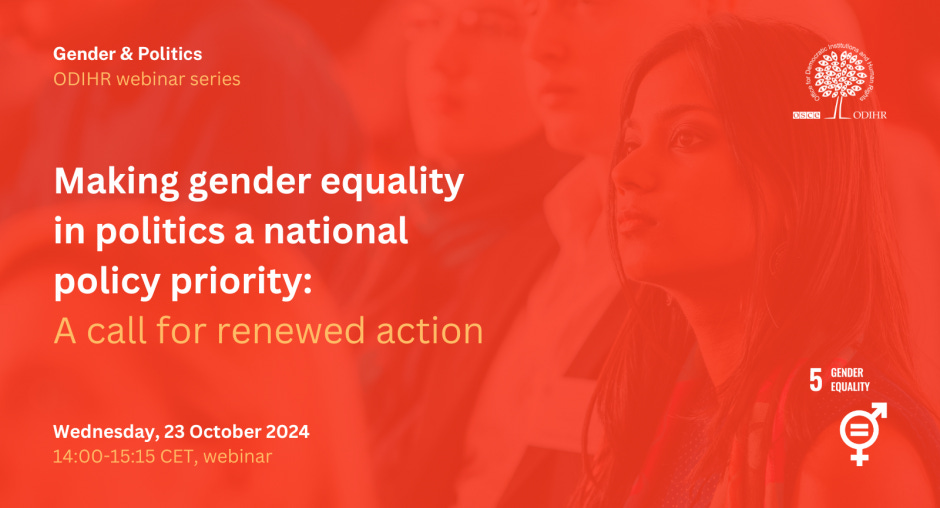Slow global progress in the big election year and other updates: All you need to know about women in politics from September
#WomenLead (Issue 154): Your monthly round-up on women in politics
Hello, and welcome to the September edition of #WomenLead!
“The first eight months of 2024 have seen limited progress in women’s representation in parliaments worldwide,” the mid-year provisional analysis published by Inter-Parliamentary Union (IPU) last month shows.
The global share of women MPs had inched up to 27 percent by the end of August, a mere 0.1 percentage point increase since the start of the year, the IPU said, raising caution that at such a pace, 2024 could end up with slower progress than recent years. Read more here.
This does not sound like good news, but we have been seeing these trends unfold in each monthly edition this year. We hope the coming months will offer hope.
In the meantime, this edition brings you updates from Azerbaijan, India, Japan, Jordan, Mexico, Sri Lanka and a lot more. In case you missed last month’s edition, you can read it here.
Election Watch
Tracking women among candidates and winners
🇦🇿 AZERBAIJAN: Women comprise a fifth of those who have been elected to the Parliament of Azerbaijan in September’s election, an improvement over the previous polls of 2020 when the share of women elected was 17.4 percent, data from IPU shows.
🇯🇴 JORDAN: Jordan went to polls for the first time after constitutional amendments and implementation of new electoral laws that have introduced a number of changes to the political system, including the increasing role of political parties. The changes had increased the number of seats reserved for women from 15 previously to 18. Twenty-seven women have been eventually elected, DW reported. This comprises a fifth of all MPs, a significant improvement from 11.5 percent in the previous polls, IPU data shows.
🇯🇵 JAPAN: Last month, Sanae Takaichi, who until recently served as the country’s Economic Security Minister, became only the first woman in Japan’s history to make it to the final run-off of the country’s Prime Ministerial race. However, she eventually lost to Shigeru Ishiba, who was eventually chosen by the Liberal Democratic Party to lead the country. Japan may have a new Prime Minister but the old tradition of keeping women on the margins of politics continues. Only two women are part of Ishiba’s 20-member cabinet, down from five previously. Read more from Reuters here.
Leaders
Updates about women leading countries, states and movements
Only 60 UN member nations have ever had a woman serve as the head of the government, the Pew Research Center has found. That comprises just under a third (31 percent) of all UN member nations. Currently, women serve as heads of government in only 13 of 193 UN member nations. Read more here.
A total of 38 candidates contested Sri Lanka’s Presidential polls held on September 21. Not one of them was a woman. However, in some redemption, the new President, Anura Kumara Dissanayake, has appointed Harini Amarasuriya as the country’s Prime Minister. She becomes the third woman to hold the office in the island nation’s history. Amarasuriya will also serve as the Minister of Justice, Education, Labour, Industries, Science & Technology, Health, and Investments. Read more about Amarasuriya here.
In India, the National Capital Territory of Delhi has a new Chief Minister in Atishi (who only uses her first name). With this, India now has two women leading states and union territories, from one previously. All other 29 chief ministers are men.
In Mexico, Claudia Shebnaum, who was elected as the country’s President earlier in May, has officially assumed office. She is the first woman in the country’s history to reach the top office.
Reading List
The more one learns, there’s only more to learn
“Why would any woman go into politics? How rising sexist abuse is undermining political representation”: The Evidence by Impact
“Brazil has struggled to elect women to political office. Upcoming elections could change that.” The Christian Science Monitor
“Why so few women are in political leadership, and five actions to boost women’s political participation”: UN Women
“The price of power: Women politicians pay more than just money”: The Nation
“The momentum is here: Mongolia’s journey towards gender equality in decision-making”: UNDP Mongolia
“To be a woman in (the Indian state) Haryana’s politics”: Behanbox
Community Watch
A quick round-up from the community working at the intersection of gender x politics
The Organisation for Security and Co-operation in Europe (OSCE) is organising a webinar on ‘Making gender equality in politics a national policy priority’ on October 23. They will review existing good practices on how governmental bodies for gender equality are promoting women’s political participation in politics and present ODIHR’s new methodology on national assessments of gender equality in politics. Sign up here.
The Fawcett Society – a UK-based charity campaigning for gender equality and women’s rights at work, at home and in public life – hosted its first-ever meeting to establish a UK Parliament Women’s Caucus in the House of Commons on September 9. Read more about it here.
That’s a wrap for this month! Liked this edition? Then press the ❤️ button and show us some love! And please, please do share this with a friend or on your social media accounts. There’s frankly nothing quite like reader love and endorsement, so please keep it coming! Thank you!
Disclaimer: #WomenLead is a non-partisan newsletter produced in a personal capacity, and does not reflect any institutional affiliation/opinion. In case of any questions, please drop in a message at womenlead.project@gmail.com.




